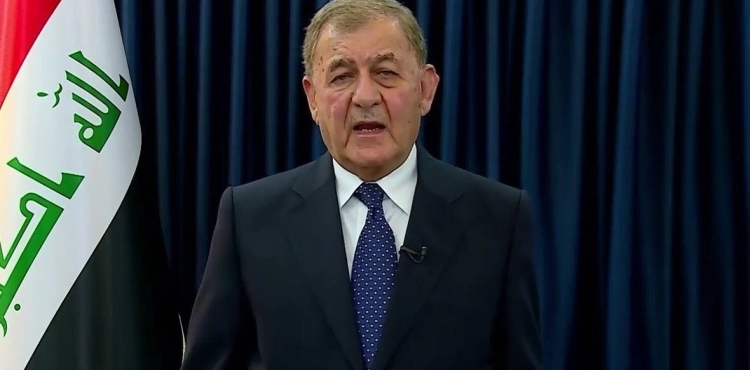The Presidency of the Republic of Iraq condemned in a statement on Tuesday the “repeated Turkish aggression,” the day after a drone attack on the Kurdistan region, which Iraq said came from Turkey, resulting in the killing of three members of the Counter-Terrorism Service in the region.
Ankara rarely comments on its military operations in northern Iraq, where it launches attacks against Turkish Kurdish PKK fighters. However, the attack by a drone on Monday on an agricultural airport in the autonomous Kurdistan region is considered unprecedented.
The statement published by the office of the President of the Republic, Abdul Latif Rashid, on Tuesday stated that “the Turkish ambassador in Baghdad will be summoned to deliver a letter of protest addressed to the Turkish presidency.”
At the same time, he wished "mercy and immortality for Iraq's heroic martyrs, both civilians and safe soldiers, who were killed as a result of the repeated Turkish aggression."
On Monday, a drone bombed the Arbat Agricultural Airport near the city of Sulaymaniyah, the second largest city in the Iraqi Kurdistan region, which is used for private aircraft to spray agricultural pesticides. The strike resulted in the killing of three members of the Counter-Terrorism Service in the region and the wounding of three others.
Meanwhile, the spokesman for the Commander-in-Chief of the Armed Forces, Major General Yahya Rasoul, said on Tuesday in a statement that the drone “entered Iraqi airspace across the border with Turkey and bombed Arbat Airport.”
This senior military official considered that "this aggression constitutes a violation of Iraq's sovereignty, security and territorial integrity," adding that Iraq "reserves its right to put an end to these violations."
Rasoul believed that "these repeated attacks are not consistent with the principle of good-neighborly relations between countries, and threaten to undermine Iraq's efforts to build good and balanced political, economic, and security relations with its neighbors."
In Sulaymaniyah, hundreds participated on Tuesday in the funeral of one of the victims of Monday's bombing at a mosque in the city of Sulaymaniyah, including security personnel, the victim's family, and residents of the area, as an Agence France-Presse correspondent witnessed.
For his part, the Prime Minister of the Kurdistan Regional Government of Iraq, Masrour Barzani, condemned in a statement on Tuesday “any violation that affects the sovereignty of the territory of the region and Iraq,” expressing his rejection of “all illegal actions that threaten the security of the Kurdistan region and undermine its stability.”
The United Nations mission in Iraq also condemned the attack, saying that "security concerns must be addressed through dialogue and diplomacy, not through strikes."
The Kurdistan region frequently witnesses bombing attributed to Turkey and Iran, targeting opposition Kurdish factions from both countries, which have been present in northern Iraq for decades.
For 25 years, Turkey has been establishing military bases in northern Iraq to confront the Kurdistan Workers' Party (PKK) rebels, who have training camps and rear bases in the region, and which Ankara and its Western successors classify as a "terrorist."
On Sunday, four fighters, including a "senior official" from the Kurdistan Workers' Party, were killed in a bombing by a "Turkish army drone" that targeted their car in the Sinjar region in northern Iraq, according to a statement by the Counter-Terrorism Service in the Kurdistan Region.
In April 2023, Iraq accused Turkey of launching a “bombing” in the vicinity of Sulaymaniyah Airport, the second largest city in the Iraqi Kurdistan region.
These strikes occurred simultaneously with the presence of American forces and the commander of the Syrian Democratic Forces, supported by Washington, at the airport.
The Iraqi presidency said on Tuesday, “Day after day, systematic military attacks on Iraqi territory, specifically in the Kurdistan region, are escalating.”
She added, "We explained to the relevant Turkish authorities on previous occasions that Iraq is ready to sit with the relevant security authorities to fill the gaps that Turkey believes are places of infiltration for those who want to harm its security," but "without seeing a real response to our calls."












